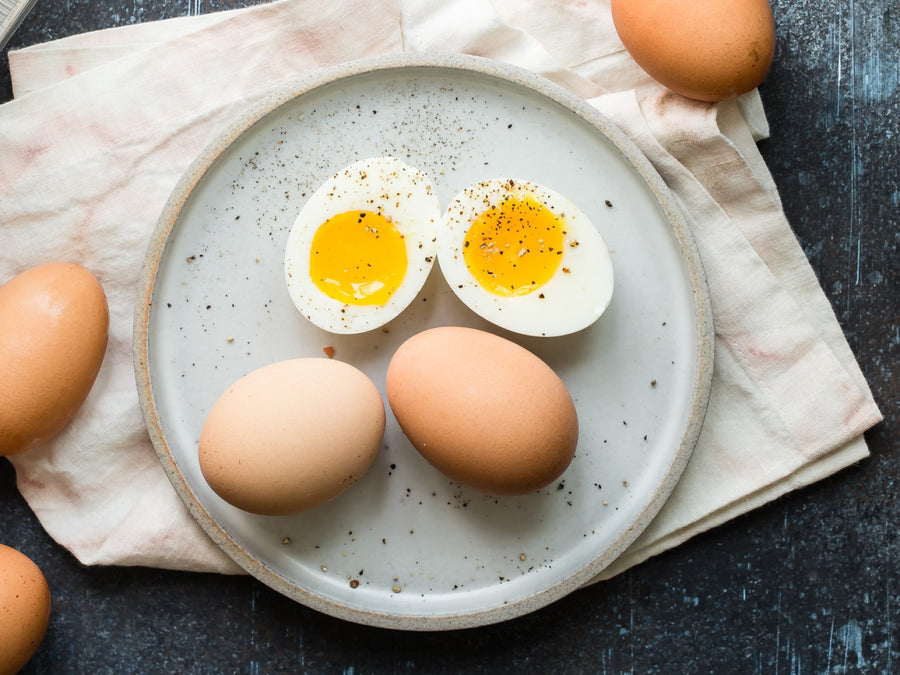
Egg Whites vs. Egg Yolks | What's the Difference?
Health Benefits and Uses of Each
High on the list of the world's most frequently asked questions about eggs is the age-old quandary: What's the difference between egg whites and egg yolks, and which is healthier? The answer is a little more nuanced than simple statements you've probably heard before, like "egg whites are low in fat and high in protein, so they must be healthier than those cholesterol-laden yolks." We've heard the opposite sentiment, too: "Egg yolks have all the vitamins, so they must be better for you." A deeper dive into the nutritional value of egg whites and egg yolks reveals that both components of the egg have some major health benefits and in general, are best enjoyed together.
Everything you want to know about egg whites
The egg white, also known as the albumen, makes up about two-thirds of the weight of the egg. One of its primary functions is to protect the yolk against microorganisms, which it does via bacteria-killing enzymes called lysozyme. Coincidentally, these antibacterial properties make egg whites a fantastic addition to DIY face masks.
Egg white nutrition
For just 15 calories, egg whites contain a whopping 4 grams of protein—that's a whole 10% of the average person's recommended daily intake contained within a mere 2 tablespoons! In addition to protein, egg whites contain a small amount of riboflavin and selenium. They're also virtually fat-free.
What are egg whites made of?
Egg whites are almost entirely composed of moisture (88%) and 6 different types of proteins (10%). The remainder of their composition includes 2% mineral ash and sugars (0.25g glucose).
Benefits of egg whites
Perhaps the most notable nutritional benefit of egg whites is protein; they're densely packed with it. Egg whites are considered a complete protein, which means they contain all 9 essential amino acids that the body cannot produce on its own. Since egg whites are low-calorie and virtually fat-free, they're often used in place of whole eggs or other protein sources such as meat, fish, and legumes for those who are looking to increase their protein intake while maintaining a lower intake of calories and fat.
Baking with egg whites
Egg whites are a crucial ingredient in many baked goods, whether they're used alone in an airy, crunchy pavlova or alongside egg yolks in quick breads, cakes, cookie doughs, and beyond. Although they don't bring much flavor to the table, egg whites play more than one essential role in baking. They can aid in:
- Adding structure: One of the mighty egg white's primary roles in baking is to provide structure to baked goods. When coagulated (heated or cooked), egg whites are "tougheners" as opposed to "tenderizers."
- Gelling/thickening: Egg whites have gelling properties that can help thicken curds and custards made on the stovetop.
- Aeration: One of the most common uses for egg whites in baking is aeration. When whipped, egg whites can take on a significant volume of air, transforming into a fairly stable foam known as meringue.
- Leavening: When folded into dry ingredients to make a batter (such as angel food cake batter), meringue works indirectly as a leavening agent, trapping air that expands while heated in the oven, resulting in a light, airy, and properly risen baked good.
Everything you want to know about egg yolks
The egg yolk makes up about one-third of the weight of an egg and contains the majority of the calories, fat, vitamins, and minerals. And here's why: when an egg is fertilized (don't worry—we don't keep roosters on our small family farms), the purpose of the yolk is to provide nutrients to the developing chick.

Egg yolk nutrition
At a mere 50 calories, egg yolks contain 4.5 grams of high-quality saturated and unsaturated fats, which is about 7% of the average person's recommended daily intake. Yolks offer less protein than egg whites but still clock in at 3 grams per yolk. And there's no shortage of vitamins, minerals, and antioxidants in these golden spheres: they're considered an excellent source of choline and selenium, and a good source of riboflavin, vitamin D, and phosphorus. They also contain small amounts of vitamins A, B6, B12, and E, plus calcium, thiamin, zinc, iron, folate, and pantothenic acid. Check out the nutrition facts for 1 egg yolk:
What are egg yolks made of?
Egg yolks are made up of approximately 50% moisture and 50% solids. Of the solids, 17% comes from proteins, 30% comes from fats and emulsifiers (primarily lecithin, which makes up about 10% of the yolk), and 3% comes from mineral ash and the yellow-orange carotenoid pigments that give yolks their color.
Benefits of egg yolks
Countless nutritional benefits come with eating the yolk. It's a healthy, nutrient-dense source of better-for-you polyunsaturated and monounsaturated fats, plus 70 milligrams of naturally-occurring omega-3 fatty acids, which are essential to numerous bodily functions and regulation. The vitamins, minerals, and antioxidants contained in the egg yolk all support the body in different ways, some helping to prevent chronic disease (like selenium), and others aiding in the absorption of calcium (such as vitamin D).
What about the fat and cholesterol in egg yolks?
For many years, it was thought that dietary fat and cholesterol were generally unhealthy and should be strictly limited. While this myth has since been debunked, many people are still misinformed today. The short answer? Yes, you can eat eggs (yolks included) every day and maintain good health. The reality is that the majority of the fat contained in an egg yolk is the healthier kind and the small amount of saturated fat that makes up the other portion accounts for just 8% of the average person's recommended daily intake. As for cholesterol? An enormous amount of research from the Dietary Guidelines Advisory Committee, the American Heart Association, and many other sources has shown that in the vast majority of cases, dietary cholesterol does not raise blood cholesterol levels.
Storing Egg Whites Vs. Egg Yolks for Recipes
Proper storage of egg whites and egg yolks is essential to maintain their freshness and safety, especially if you often separate eggs for different recipes.
Storing Egg Whites
If you have leftover egg whites, store them in an airtight container in the refrigerator. They can be kept for up to 4 days. Make sure to label the container with the date to keep track of its freshness.
Egg whites freeze exceptionally well. Pour them into an ice cube tray or a freezer-safe container, and once frozen, transfer them to a resealable plastic bag. They can be stored in the freezer for up to 12 months. When ready to use, thaw them in the refrigerator overnight.
Before using refrigerated or thawed egg whites, bring them to room temperature for better whipping results, especially if you’re making meringues or other aerated dishes.
Storing Egg Yolks
Egg yolks can dry out quickly, so it’s important to cover them with water in an airtight container before refrigerating. They can be stored this way for up to 2 days. Remember to drain the water before using the yolks.
Freezing egg yolks requires a bit more preparation. To prevent them from becoming gelatinous, beat the yolks with a pinch of salt or sugar (depending on whether you plan to use them for savory or sweet dishes) before freezing. Store them in a freezer-safe container for up to 3 months. Thaw in the refrigerator when needed.
Use thawed yolks in cooked dishes like custards or sauces, as they may not have the same texture as fresh yolks.
Should I eat the whole egg?
Yes, you should eat the whole egg! Not only is eating the whole egg a great way to minimize food waste in your home, but it's also the only way to get the benefit of both the complete protein in the white and the numerous vitamins, minerals, antioxidants, and healthy fats in the yolk.
For an extra protein boost, consider mixing egg whites with whole eggs in your meals. This combination allows you to maximize nutritional benefits - in other words, you get the best of both worlds!












